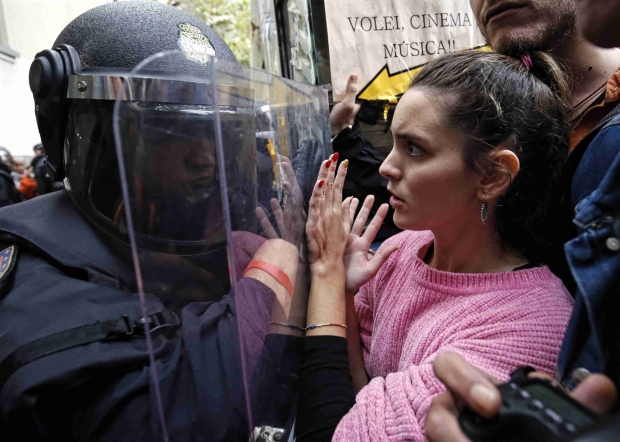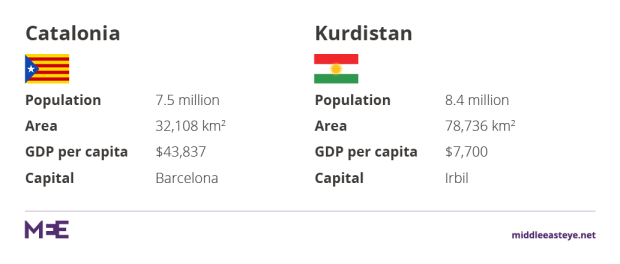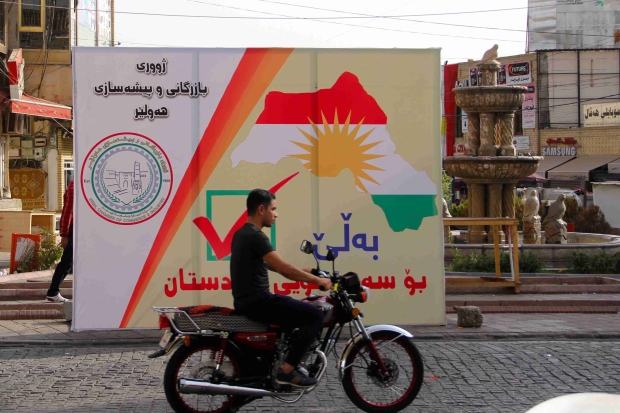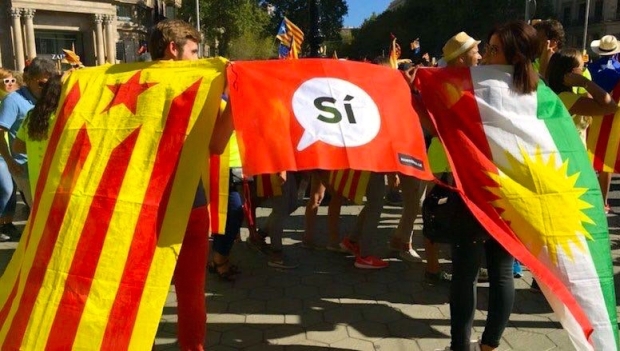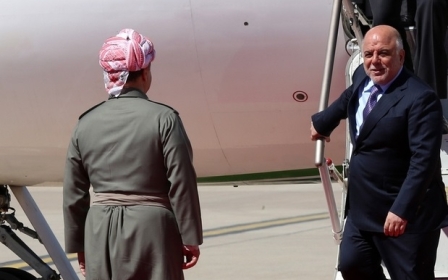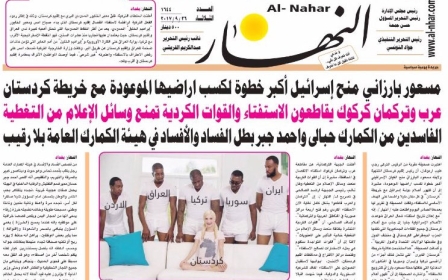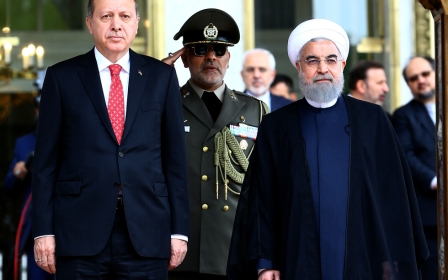Catalans and Kurds: Different worlds, same dreams of independence
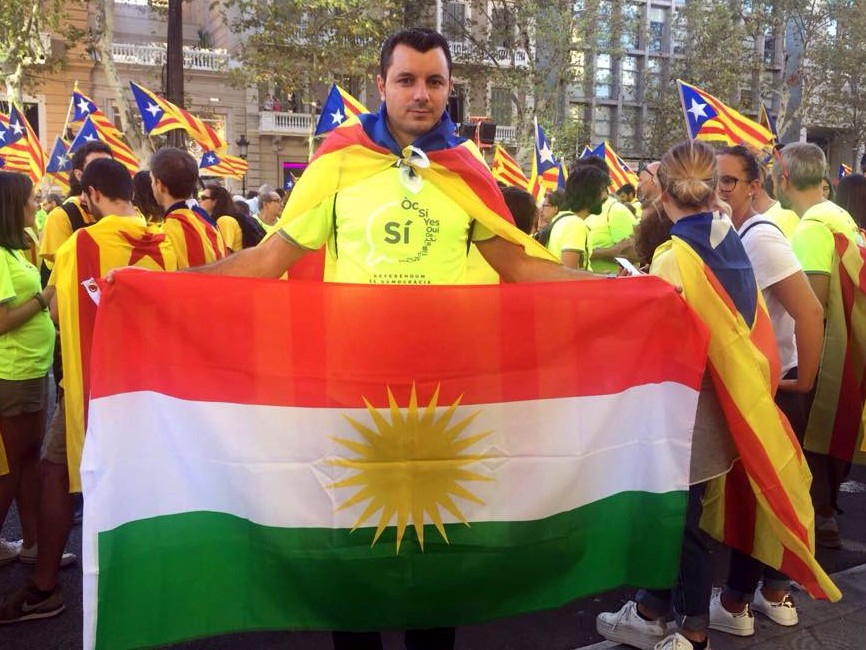
BARCELONA, Spain - Hundreds of thousands mobbed the streets of Catalonia this week to protest against violence during the region’s independence referendum.
According to Barcelona’s local police force, which is run by city hall, 700,000 people gathered in the centre of the city for a general strike convened by several unions and political parties.
Tuesday’s mass protest came just 48 hours after the Spanish government in Madrid sent 10,000 riot and police officers - from both the national police force and the civil guard - to prevent the region’s referendum on independence that it considers illegal.
That action resulted in violence which left more than 840 civilians injured, according to the Catalan authorities. Madrid says that more than 400 of its officers were also hurt.
And then there were the banners carried by the Kurds, who had staged their own similar vote a week earlier – but without the violence seen in Catalonia.
Mohammed Hussein, 37, is a Kurdish journalist who has lived in Catalan’s capital, where he is studying for a masters degree in economics, since September.
"What happened in Barcelona during the referendum was very surprising and shocking,” he said. “I would have never imagined that such a level of police violence could be used in a European country like Spain simply because of political ideas."
How do they differ?
The leaders of Iraqi Kurdistan and Catalonia may both want independence – but their fledgling states are very different.
An estimated 2.2 million people – 42 percent of registered electors - voted in Catalonia’s 1 October referendum, of whom nearly 90 percent backed independence, the Catalan authorities reported.
That compares to a near 72 percent turnout in Iraqi Kurdistan, where 92 percent of voters supported independence.
Catalonia is one of the richest regions in Spain due to a robust economy built on industry and tourism. It accounts for 19 percent of Spain’s GDP and more than a quarter of the country’s foreign exports.Iraqi Kurdistan meanwhile makes up around 20 percent of the population of Iraq: oil is the chief foundation of its economy, although it is also seeking to diversify more into the cement industry and real estate among others.
"Although the political context is very different, Catalonia and Kurdistan are keen to have their own state,” said Hussein. “But unfortunately, the leaders in both Madrid and Baghdad do not respect the right to self-determination."
Baghdad: Making life tough for Kurds
The Iraqi government has called the Kurdish vote, which is not binding, illegal. Along with neighbouring countries including Iran and Turkey, it has imposed sanctions on the Kurdish Regional Government (KRG).
One of the first measures was an embargo, imposed by Baghdad, on international flights to and from Kurdistan.
It leaves Hussein anxious about returning to his hometown of Sulaymaniyah because the international airports there and in Irbil have been shut. “Because I am ethnically Kurd it will be dangerous for me to travel using domestic flights via Baghdad,” he said.
Sa’di Ahmed Pira, a politbureau member of the Patriotic Union of Kurdistan (PUK), said: “It is irresponsible to start illegal sanctions and create a problem between Kurds and Shias at the Iraqi Parliament.”
Many supporters of Catalan independence, engaged in their own campaign, have backed the Kurds.
Cèlia Appel, a spokesperson for the SEPC, the main students union in Catalonia, said: "The attitude of Baghdad is another example of repression used by a state as a method to control the people. This has to be pointed out and condemned.”
"The Kurdish people must keep fighting and taking the streets because that's how things are done. If you follow the institutional way then nothing is achieved.”
Madrid: Opposing Catalan plans
The speed of events in Catalonia during the past seven days has been just as frenetic as those thousands of miles away in Iraqi Kurdistan.
During last few weeks hundreds of students have occupied main public universities as an expression of protest against the attitude of the Spanish government.
On Tuesday evening, Felipe VI, king of Spain, in a rare TV address to the nation called for unity and said that the situation was "extremely serious". He accused Catalan leaders who organised the referendum of “breaking the democratic principles of the rule of law” and warned about the “fracture of Catalan society”.
On the same day, Catalan president Carles Puigdemont told the BBC that “Catalonia will declare independence from Spain in a matter of days.”
In a show of solidarity with Catalans, Brino Tamo, a 60-year-old businessman from Kobane in Syria's Kurdish region, who's been living in Catalonia for three decades, closed down his five clothes shops in Barcelona in support of the general strike.
"After voting I spent the whole day protecting the polls and helping the referendum organisers,” said Brino, who voted for Catalan independence.
Eulalia Reguant, a Catalan MP for the separatist left-wing CUP party, said she had received support from Kurdish organisations and political parties. The CUP has strong ties with the Peoples' Democratic Party (HDP) in Turkey.
'After voting I spent the whole day protecting the polls and helping the referendum organisers'
- Brino Tamo, Kurdish businessman
“The HDP movement assume that Turkey is a repressive state, but they never thought such violence was possible in an EU member state," she said.
Many Kurds picked up on the levels of violence in Catalonia compared to Kurdistan.
Pira said that Kurds backed the Catalans right for self-determination and said the way in which Spanish police tried to maintain stability and security during the vote was uncivilised. “In Kurdistan we didn’t have any violent incidents during the referendum, which we celebrated eight days ago,” he said.
Hussein added: “The Kurdish referendum was organised and passed without problems because we have the peshmerga forces, which can be stronger than the Iraqi army somehow. In the case of Catalonia, there isn't a military, only a police force.”
The prospect of violence
Kurds in Catalonia are hopeful for the future of Iraqi Kurdistan. Tamo told MEE that the region had been acting as a semi-independent state for years. “They have a strong army and control over the borders," he said. "They have also helped the Iraqi government expel IS from many territories. Iraqi Kurdistan will declare independence very soon.”
Hussein likewise was positive and hoped that the situation would remain calm in both.
But he cautioned: “The probability of having violence in Catalonia is less compared to Kurdistan, where there is always the possibility of a civil war."
This article is available in French on Middle East Eye French edition.
Middle East Eye propose une couverture et une analyse indépendantes et incomparables du Moyen-Orient, de l’Afrique du Nord et d’autres régions du monde. Pour en savoir plus sur la reprise de ce contenu et les frais qui s’appliquent, veuillez remplir ce formulaire [en anglais]. Pour en savoir plus sur MEE, cliquez ici [en anglais].


